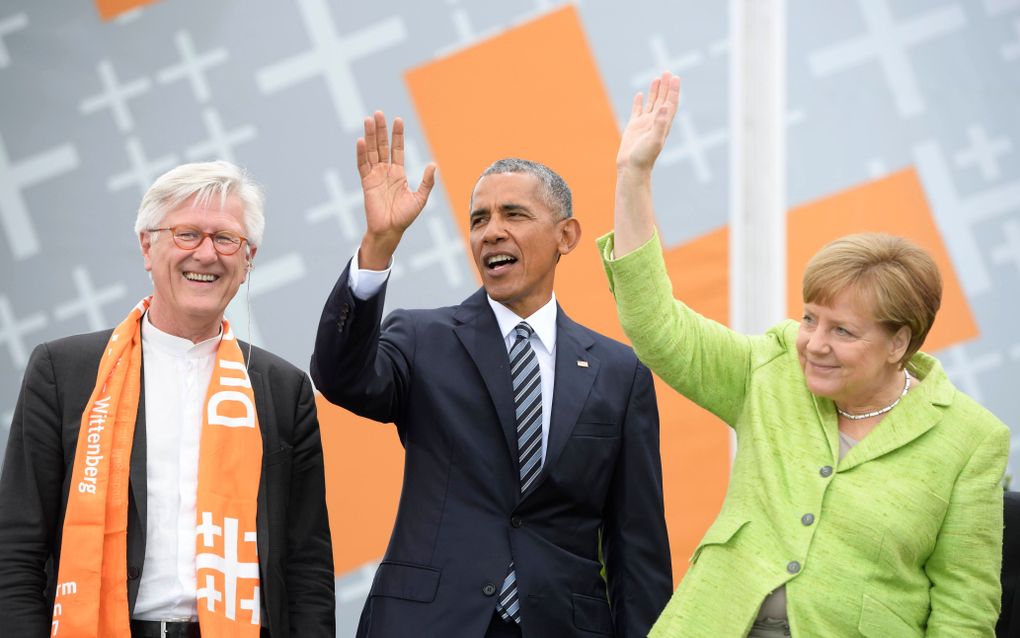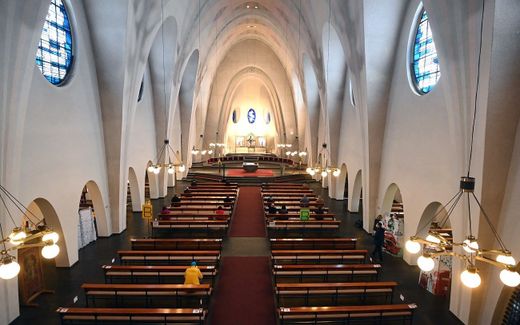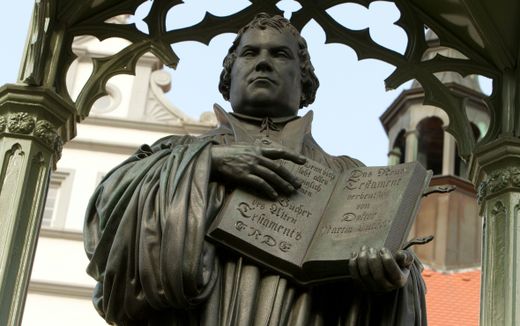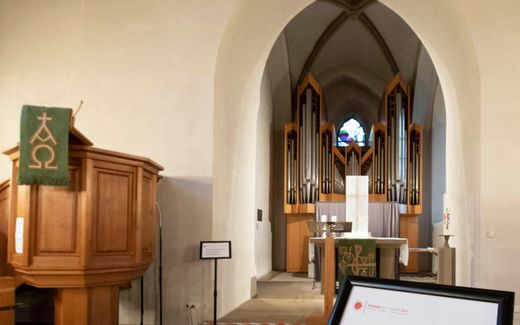New figurehead for German national church
09-11-2021
Central Europe
Arie de Heer, RD

The times, they are changing. President Obama (middle) has gone already, Mrs Merkel (right) will be leaving soon. And also Dr Bedford-Strohm (left) will be replaced as president of the German church. This photo was taken at an activity around the commemoration of the Reformation in 2017. Photo EPA, Carsten Koall
Central Europe
The synod of the Evangelische Kirche in Deutschland (EKD) –Evangelical Church in Germany– will digitally elect a new council president. Bishop Dr Heinrich Bedford-Strohm (60) steps down after seven years of being the figurehead of the protestant peoples' church. Five questions and answers.
How is the EKD organised? After the horrors of the Second World War, the representatives of the Lutheran, Reformed ("reformierte"), and the United ("unierte") churches in Germany decided to make a new start. In 1949, the Evangelical Church was founded.
At that time, the church consisted of 28 independent churches; nowadays, only 20 are left, mainly due to the progressing secularisation. The churches, with individual synods, usually cover the state in which they are located. Dr Bedford-Strohm (Munich) is, for example, part of the EKD of Bavaria.
The council of the EKD could be described as the daily management of the Evangelical Church of Germany. The president is the contact person of the church, also for the press. He is asked regularly to comment on issues and shows up at many important meetings; recently, he spoke in the church of Aachen during the commemoration of the victims of the floodings in Germany.
How many members does the EKD have? According to the newest statistics, the church counts 20.24 million members. Therefore, the EKD is the second largest church in Germany. The Roman Catholic Church consists of 22.2 million members, on a total of 83.1 million German inhabitants. However, only a fraction of the members of both churches visit the church services on Sunday. Next to these large denominations, there are "free churches" in Germany.
For what period is the president of the EKD-council elected? The 15 members of the EKD council are always elected for six years. That is also what happens this Tuesday: the 128 members of the synod and the 20 churches that are represented in the so-called church conference will elect 14 new members for the council. Out of these members, they will choose a new president and an alternate president on Wednesday.
Dr Bedford-Strohm could have served another period of 6 years. However, he rejected that possibility. In his opinion, a "new person, focussing on new emphases" should take over. The 60-years old theologian also desired to spend more time on scientific activities. Bedford-Strohm is specialised in social ethics.
Yet, Bedford-Strohm served longer than the two presidents before him: in 2014, he succeeded Nikolaus Schneider. Schneider stepped down after four years of service because his wife was severely ill.
Before Schneider, Margot Kässmann stepped down in February 2014, only a few months after her election. The reason was that she was caught for drinking and driving. Kässmann had succeeded Wolfgang Huber, who did serve his 6-year period from 2003 to 2009.
However, the length of time one served does not give a complete picture: as president Margot Kässman was also popular outside of the EKD; Bedford-Strohm did not possess such an outspoken profile.
Was there not earlier this year a news item that a 25-year-old philosophy student became president of the EKD? Almost correct. The 25-year-old Anna Nicole Heinrich was chosen for president of the synod of the EKD. Not an irrelevant position –the student leads the synod meetings of these days– yet the president of the EKD council serves more as the face of the church towards outsiders. Anna-Nicole Heinrich, nevertheless, is the 15th member of the EKD council; she is the only one that does not need to be elected on Tuesday.
To what extent is the outcome of the election of the new president predictable? For the election of the EKD council, 22 people registered as a candidate: 11 men and 11 women. Nine of them are already part of the council. One candidate, reporter Miriam Hollstein, recently pulled out.
German media point in the direction of the 60-year-old Kirsten Fehrs (bishop in Hamburg), 59-year-old Annette Kurschus (president of the Evangelical Church of Westphalia), and the 61-year-old Dr Volker Jung (president of the Evangelical Church in Hesse and Nassau).
Also, EKD council member Dr Michael Diener (59), previously president of the conservative Gnadauer movement and the German Evangelical Alliance, nominated himself for the council. But it is likely that he will not be elected to be the face of the –progressive– German peoples' church. Even though Diener in 2015 made some statements about homosexuality that alienated his conservative constituency, he will still be too conservative for the general membership of the EKD-synod. We will know on Wednesday.
This is a translation of an article published by Reformatorisch Dagblad on November 8th, 2021
Related Articles





